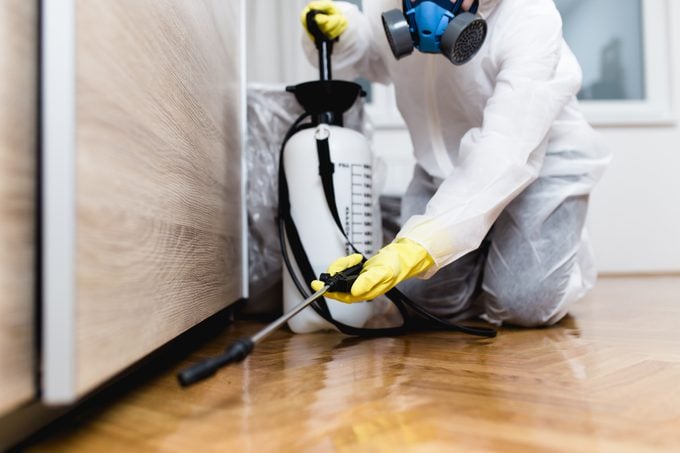They'll crunch and they'll munch and they'll chew your house down! Here's how to work with an exterminator to battle termites and come out on top.

Tips for Hiring a Termite Exterminator

Termites are small creatures that cost homeowners big — in the U.S., more than $5 billion in property damage every year. They are voracious eaters, and there are plenty of them, too. The U.S. is home to about 50 termite species, in every state except lucky Alaska.
According to Nicholas Martin, entomologist and founder of Pest Control Hacks, infestations of subterranean, sapwood or drywood termites are most likely throughout the South (coast to coast) where the climate is warmest.
Late summer is a perfect time to brush up on termite knowledge and do some prevention work. It’s the time of year when termites emerge and start looking for places to start a colony, says Scot Hodges of Arrow Exterminators, an Atlanta-based extermination company.
But before we get to that, let’s cover these pressing questions first:
On This Page
When Should You Call a Termite Exterminator?
Short answer: Now. “You must call a termite exterminator immediately as soon as you notice any signs of their presence in the house,” says Martin. “Termites are fast and can quickly chew your house value down.”
And Martin says don’t bother with DIY in this case. “Controlling them with DIY methods is ineffective in 99.9 percent of cases, so don’t waste your time and money,” he says
Martin offers these telltale signs of a termite infestation:
- Inspect the wooden part inside the house. Tap every wooden part that has holes in it. Hollow-sounding wood with pellets falling out from the holes is “100 percent a sign of an infestation,” he says. If it’s not termites, it may be carpenter ants, which can also be dangerous for your property.
- Look for mud tubes. If there’s an infestation of subterranean termites, you’ll find mud tubes on the exterior walls; termites build them as a moisture source and a shelter. Even if there are no termites inside, they are nearby.
- Look for swarmers. Flying termites, or swarmers, create new colonies during infestations. If you find their discarded wings, call an exterminator immediately.
In addition, Hodges says, watch for distorted areas of paint or wood surfaces that appear “bubbled” or cracked. And don’t forget about frass, or termite droppings, which have a hard, gritty feel. They’re a sign of drywood termites.
What Should You Ask an Exterminator?
Anna Bennet of Archer Pest Control says when your exterminator comes to assess your property, consider asking:
- How much does the service cost?
- What types of products do the exterminators use? Are they non-toxic?
- Is the treatment safe for humans and pets or do you need to leave the property during the extermination?
- How long does the service take?
- Are there any guarantees that the termites won’t return?
- Is the service insured?
- Do you need to prepare for the exterminators in any way?
- Will they bring all the necessary equipment for the treatment?

What Will the Exterminator Do?
Termite infestations and species vary, and so do treatments. Typically, exterminators will come out for an assessment, and then provide you with treatment options to choose from. From there, a plan forms.
Martin says termite exterminators treat the perimeter of the house, the foundation and any infested areas with contact termite pesticides to kill them immediately. A strong chemical barrier protects the house from reinfestation.
Bennet says different methods can be employed, including bait stations, liquid pesticides, fumigation and more. Non-chemical treatments such as heat treatment also exist. “Every extermination company uses different methods for pest elimination,” Bennet says. That’s all the more reason to ask lots of questions before moving forward with a plan.
If you have a full-blown infestation, it’s possible you will need a fumigation, which involves tenting your home and vacating it for up to three to four days.
Is Termite Extermination Safe?
If all the chemicals are handled by professionals and you follow all the precautions, there will be no harm to you, your pets, or your household, Martin says.
How Much Does a Termite Exterminator Cost?
According to Martin, pricing for termite extermination can vary from $5 to $20 per linear foot. “You should be ready to pay from $400 to $1,200,” he says. Other national averages reported by exterminators range from $500 to $800.
How Do I Prevent Termite Infestations?
Hodges offers these easy maintenance tips to keep termites away.
- Eliminate moisture around foundations. Divert water from the house by using proper downspouts and gutters. Termites are attracted to moisture.
- Do not stack firewood or lumber near your home. Termites can burrow into the woodpile and then right on into the home.
- Remove old tree stumps in the yard.
- Keep tree branches and shrubbery well-trimmed and away from the house, which will also help with inspections and finding termite infestations.
- Avoid excess piles of mulch — this is a favorite food source for termites.
- Reduce humidity in crawl spaces with proper ventilation.
- Have your home inspected annually by a licensed pest professional who specializes in termite control. If you have termite protection, maintain your coverage and renew annually.




















